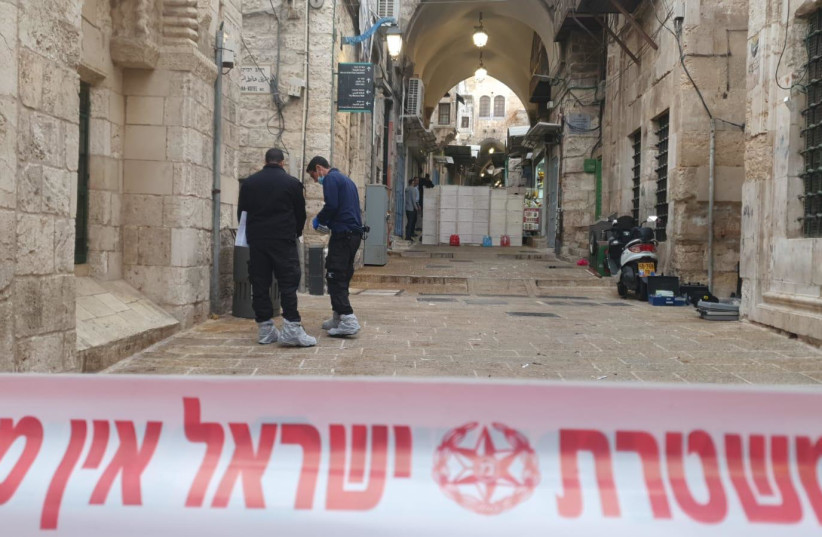What is clear is that he was affiliated with Hamas and regularly expressed views similar to those of the Gaza-based group.

Those who knew Sheikh Fadi Abu Shkhaydam were not surprised to hear that he was the terrorist who carried out the shooting attack in the Old City of Jerusalem on Sunday morning.
Described by his friends and acquaintances as an “Islamic scholar,” the 42-year-old Abu Shkhaydam was a well-known preacher in east Jerusalem mosques, including al-Aqsa Mosque. Others referred to him as a “senior Hamas official in Jerusalem.”
It was not clear whether he held an official position with Hamas.
What is clear is that he was affiliated with Hamas and regularly expressed views similar to those of the Gaza-based group.
Abu Shkhaydam was known for his daily presence at the Aqsa Mosque compound, where he used to deliver sermons and lead protests against tours by Jewish groups.
He was not, however, affiliated with the Jordanian-controlled Wakf Islamic religious trust, which administers the Islamic holy sites in Jerusalem.
Fadi Abu Shkhaydam from East Jerusalem and Hamas member has been identified as the attacker pic.twitter.com/EnVZQhLNXC
— Anna Ahronheim (@AAhronheim) November 21, 2021
In addition, he was known as a prominent and influential figure in Shuafat refugee camp, where he helped resolve family and personal disputes.
A father of five, Abu Shkhaydam was born in Shuafat, the only camp located within the boundaries of the Jerusalem Municipality. The camp is run by the United Nations Relief and Works Agency for Palestine Refugees, although it falls under Israeli sovereignty.
Most of the original residents of the camp, located between Jerusalem’s French Hill and Pisgat Ze’ev neighborhoods, came from the Old City of Jerusalem before the 1967 Six Day War.
The residents of the camp, including the Abu Shkhaydam family, hold Israeli-issued ID cards in their capacity as permanent residents of Jerusalem.
Permanent residents of Israel are entitled to all the rights of an Israeli citizen, except the right to vote in a general election.
They are nevertheless entitled to vote and present their candidacy in the municipal elections, but most Arab residents of Jerusalem have been boycotting the municipal elections since 1968 on the pretext that participation in the vote would be seen as recognition of Israel’s decision to annex east Jerusalem.
Abu Shkhaydam’s friends referred to him as a “mourabit” (garrison soldier or defender of the faith) because of his efforts to prevent Jews from visiting the Temple Mount.
It is believed that more than 1,000 men and women have been recruited by various Islamic groups to “defend” al-Aqsa Mosque against alleged attempts by Israel to “change the status quo” by allocating prayer space for Jews at the Temple Mount.
In 2015, Israel outlawed the mourabitoun (plural for male mourabit) and mourabitat (plural for female mourabita).
Despite the ban, dozens of men and women, including Abu Shkhaydam, continued to arrive at the Temple Mount almost every day to harass and shout at Jews who enter the area under police protection.
“Sheikh Fadi was a permanent mourabit at al-Aqsa Mosque,” said his uncle Shibli Sweiti. “He studied Sharia [Islamic law] and was working on his PhD. He was an educator at the mosque and taught Sharia in some of Jerusalem’s schools.”
Abu Shkhaydam worked as a teacher of Islamic education at al-Rashidiya Secondary School across the street from Herod’s Gate. The school operates under the supervision of the Jerusalem Municipality.
In videos that surfaced on social media platforms after the attack, Abu Shkhaydam is seen chanting slogans on the Aqsa Mosque compound, pledging to defend the site from any “aggression.” In other videos, he is seen praising Palestinian prisoners held in Israeli jails and urging Muslims to fight against their “oppressors.”
In a recent sermon during Friday prayers, Abu Shkhaydam lashed out at Arab heads of state, dubbing them “prostitutes” because of their alleged “collusion” with Israel and “betrayal” of the Palestinians.
As reported by The Jerusalem Post
